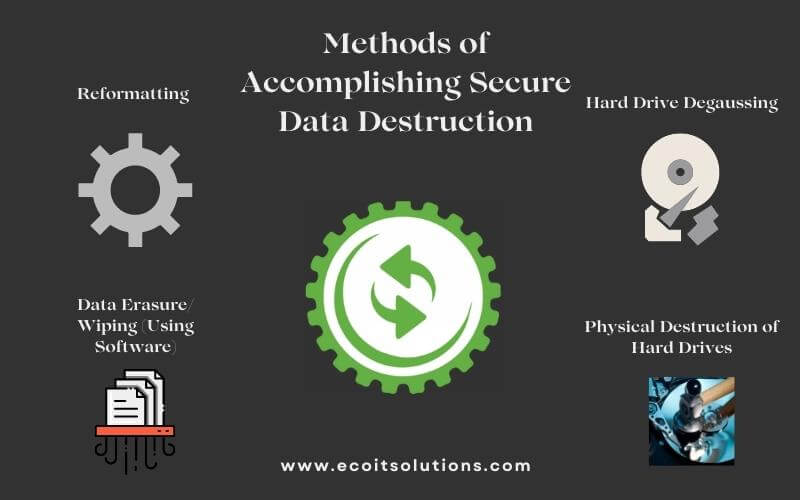Enhancing Cyber Security through Advanced Data Destruction Techniques
Enhancing Cyber Security through Advanced Data Destruction Techniques
Blog Article
The Necessary Nature of Data Destruction in Upholding Computer System Safety Solutions and Protecting Against Unauthorized Gain Access To
In an age where information violations and identity theft are progressively widespread, the significance of effective data damage can not be overstated. Organizations needs to recognize that the failure to properly get rid of delicate info postures not only legal and economic dangers however additionally a potential disintegration of client count on. Numerous techniques, from data cleaning to physical destruction, act as crucial safeguards against unapproved gain access to. However, comprehending the ramifications of data destruction practices and compliance with guidelines raises necessary questions concerning the competence of existing techniques and their lasting feasibility despite evolving dangers.
Importance of Data Destruction
In an increasingly electronic world, the significance of data devastation can not be overemphasized. As companies amass large quantities of delicate information, the potential repercussions of falling short to appropriately get rid of and take care of of that data become progressively serious. Data breaches, identity theft, and corporate reconnaissance pose considerable risks, emphasizing the requirement of efficient data destruction practices.

Additionally, as innovation progresses, so also do the approaches through which malicious stars look for to manipulate sensitive info. Organizations needs to stay watchful and proactive in their data damage techniques to secure versus these progressing risks. By focusing on data devastation, business not just shield their possessions however likewise foster trust amongst stakeholders and customers, showing a commitment to liable data administration and protection practices.
Techniques of Effective Information Devastation
To make sure the irreparable and complete damage of delicate information, companies can employ a range of effective approaches tailored to their details requirements. One of one of the most usual techniques is data cleaning, which includes utilizing specialized software application to overwrite existing data numerous times, making recovery practically difficult. This is specifically beneficial for solid-state drives and difficult drives, where standard deletion approaches are inadequate.
One more effective approach is degaussing, which utilizes strong electromagnetic fields to interrupt the magnetic domains on storage media, making the data irretrievable. This approach is particularly suited for magnetic storage space gadgets, such as tape drives and tough disks.
Physical devastation is also a viable alternative, including the shredding, squashing, or incineration of storage space gadgets. This method assurances that data can not be recovered, making it perfect for companies handling extremely sensitive info.

Compliance With Information Defense Regulations
Organizations have to not only concentrate on reliable information devastation methods but also make sure conformity with data defense laws that control just how delicate information is managed and dealt with. Following these laws is vital for keeping and guarding personal data customer count on. Laws such as the General Information Security Guideline (GDPR) in the European Union and the Medical Insurance Portability and Liability Act (HIPAA) in the USA enforce strict standards on information monitoring, which include demands for the safe disposal of sensitive info.
To attain compliance, organizations must carry out detailed information damage plans that straighten with these lawful frameworks. This includes determining information that requires destruction, developing procedures for safe and secure methodsâEUR" such as shredding physical media or utilizing software that satisfies industry requirements for information wipingâEUR" and maintaining in-depth documents of destruction tasks. Regular audits must be carried out to ensure adherence to these policies and to recognize any kind of potential areas for improvement.
Failing to adhere to information security policies can result in significant legal ramifications, consisting of large penalties and damages to a company's reputation. For that reason, incorporating compliance right into information devastation practices is not only a legal commitment however likewise a critical component of a robust info safety and security strategy.
Consequences of Poor Data Handling
Poor data handling can result in severe repercussions that expand past immediate functional setbacks. Organizations might encounter substantial financial losses due to information breaches, which often result in costly removal efforts, legal costs, and governing fines. These economic effects can hinder and strain resources growth, eventually affecting an organization's bottom line.
Moreover, bad information handling can significantly harm a company's reputation. Companions, customers, and stakeholders might shed count on in an entity that fails to secure sensitive info, resulting in lowered client commitment and possible loss of service opportunities. This erosion of depend on can take years to restore, if it can be recovered whatsoever.
Additionally, companies could face legal ramifications occurring from non-compliance with data protection policies. Such violations might cause investigations and charges, intensifying the financial burden and more tainting the company's image.
In the realm of cybersecurity, poor data monitoring practices can create susceptabilities that make systems much more prone to unapproved access and cyberattacks. Inevitably, these consequences underscore the vital significance of executing durable data handling procedures to secure delicate information and maintain business integrity.
Ideal Practices for Secure Data Disposal


To start with, information ought to site be identified according to its sensitivity. Delicate information requires a lot more rigorous disposal methods, such as shredding physical records and using innovative software application for digital information cleaning. Utilizing licensed data devastation solutions ensures conformity with industry guidelines and standards.
Secondly, organizations should apply a data disposal plan that mandates routine audits. This plan ought to lay out the treatments for information retention and damage, ensuring that obsolete data is dealt with quickly and safely. Educating staff members on these procedures is important to cultivating a culture of safety understanding.
Last but not least, maintaining comprehensive documents of disposed information improves responsibility and offers a clear audit route. This paperwork needs to consist of the sort of data damaged, the approach used, and the day of disposal.
Conclusion
Taking on durable techniques such as information cleaning, degaussing, and physical damage, along with conformity with guidelines like GDPR and HIPAA, is necessary for securing delicate info. Overlooking proper information see this disposal techniques can lead to extreme consequences, consisting of data violations and legal consequences.
In a period where data violations and identity theft are progressively widespread, the importance of effective information devastation can not be overstated. data destruction. Data violations, identity burglary, and corporate espionage pose substantial dangers, emphasizing the requirement of efficient information damage practices
Compliance with policies such as GDPR and HIPAA mandates that companies apply rigorous data security steps, consisting of the protected damage of data at the end of its lifecycle.
By focusing on data devastation, firms not only safeguard their properties however likewise foster depend on amongst customers and stakeholders, showing a dedication to accountable data administration and safety and security techniques.
Organizations must not just focus on reliable data damage techniques however additionally make certain conformity with information protection laws that govern how delicate information is taken care of and disposed of.
Report this page